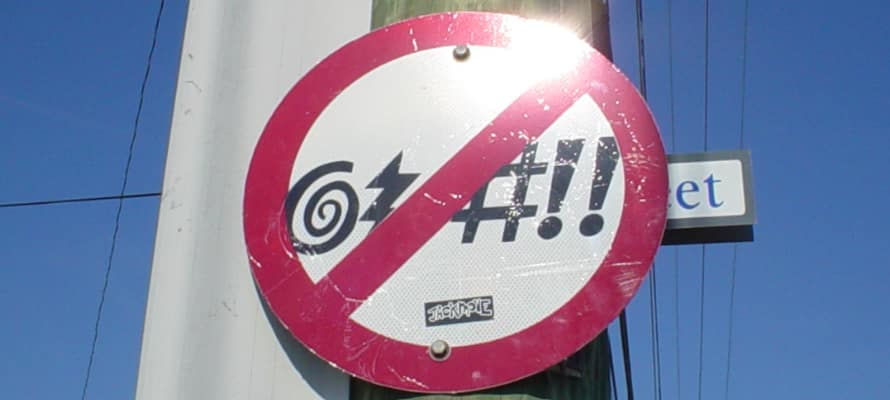Photo credit: foxxyz / Foter.com / CC BY-NC-SA
In a youtube video titled “Potter Puppet Pals: Wizard Swears” a warning is displayed, notifying the viewer that the content is rated PG-13 due to “language and boyish attitude”. In the video itself Harry Potter and his friends test out some wizard swears that were recently banned at Hogwarts School. They ask their headmaster if he knows any archaic “lost to the ages” wizard swears and he tells them the Elder Swear after making them promise to never repeat it. Harry and his friends then proceed to use the Elder Swear to taunt their classmate Neville who finds their profanity offensive.
In his book The Stuff of Thought: Language as a Window into Human Nature, Steven Pinker details the five different functions of swearing: abusive swearing, cathartic swearing, dysphemistic swearing, idiomatic swearing and emphatic swearing.
- Abusive swearing is used to hurt others. It is intentionally used to insult or belittle another person. Its something one might use when they are angry with someone and wish to upset them.
- Cathartic swearing is used to express a negative emotion. It’s something that would be used when you trip and fall or when you spill a drink. It conveys to others how upset you are.
- Dysphemistic swearing is the opposite of a euphemism. Whereas a euphemism is indirect and is less unpleasant for other people, a dysphemism is used to convey the unpleasantness of a subject.
- Idiomatic swearing is used to grab attention. It creates a sense of informality between people and can help create a casual atmosphere.
- Emphatic swearing is used to emphasize something. It can be used to emphasize shape, size or some other quality.
Religious Standpoint
One type of abusive swearing in Medieval Europe involved swearing oaths. It’s when the person who you are intending to hurt is God. This type of swearing was especially bad, due to the belief that if you swore you physically injured God himself.
Many modern swear words also involve using religious words in such a way that it doesn’t respect God. This means that Christians especially find swearing offensive, and since Christianity is the largest religion in the United States it’s inevitable that many people will find profanity offensive.
Swearing is also discouraged in the Bible, as it says in Colossians 3:8:
“But now you must put them all away: anger, wrath, malice, slander, and obscene talk from your mouth.”
Not only Christians are against swearing. Almost every major religion is against swearing as well. Islam forbids swearing as the Quran 49:11 says:
“O you who have believed, let not a people ridicule [another] people; perhaps they may be better than them; nor let women ridicule [other] women; perhaps they may be better than them. And do not insult one another and do not call each other by [offensive] nicknames. Wretched is the name of disobedience after [one’s] faith. And whoever does not repent – then it is those who are the wrongdoers.“
Judaism also bans swearing and foul language in the Talmud, which says that:
“One should always discourse in decent language”
Class Difference
In Medieval Europe, the Normans were of a higher class than the Anglo-Saxons. The Normans spoke a mixture of both French and Latin, whereas the Anglo-Saxons, the commoners, spoke English.
This led to a difference in words used for the same object. For example, the Anglo-Saxons worked with the animals, and are responsible for animal names such as cow and pig. The Normans however, only ate the animals, which is were we get the names of the meat of animals, such as beef and pork.
The same holds true for swear words. Offensive words tend to have Germanic roots and their more polite counterparts tend to have roots tying back to French and Latin. The lower-class Anglo-Saxons are the origins for many of the words we consider profanity, and the upper-class Normans are responsible for many of the words that are considered socially acceptable.
Swearing Can Actually be Good
Despite the major public opinion that swearing is bad, there is also evidence that swearing can be good. In a study led by Richard Stephens of Keele University it was shown that swearing can increase your pain tolerance. A group of 67 undergraduates submerged their hands in buckets of ice water, and it was shown that the students who swore were able to keep their hands submerged longer than the students who didn’t. It is speculated that the swearing triggered a fight or flight response in the students, which led to their higher pain tolerance due to increased adrenaline.
This effect is demonstrated in the AsapSCIENCE video below:
So whether you believe that swearing is good or bad is up to you, but ultimately there is plenty of evidence to back of both viewpoints.





What do you think?
Show comments / Leave a comment